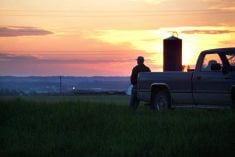Here s a tough one. If you were going to design an ideal farm with an ideal farm manager, and you were going to spell out all the things they’d need to do in a year, how much time would you set apart for them to read?
I know, I know& it isn t an ideal world, so the answer is not a lot. There are always at least five things to do with every minute, and at least 4-1/2 of them seem higher priority right now than reading a book.
Read Also

The big squeeze: How to be fair to siblings during farm succession
Managing sibling business relationships on family farms.
So how do you explain that so many of the truly successful people you know always seem to be up on the newest authors and have read the coolest books?
We went to five fantastically busy people and asked them, What have you been reading that is shaping how you look at your farm and the world? Without exception, it turned out they all have at least one book on the go, and sometimes many more.
The key, they told us, is to find the books that inform you, and energize you too.
ELAINE FROESE, BOISSEVAIN, MAN.
OUTLIERS
By Malcolm Gladwell
When COUNTRY GUIDE caught up to popular columnist, book author and speaker Elaine Froese, she was on her way out the door to volunteer with the harvesting of local FoodGrains Bank plots. It had been a year that Froese described as challenging, but it was also a year of reading. Froese is a voracious reader, and she had recently checked out Malcolm Gladwell s OUTLIERS from the local library.
Froese farms with her husband in south-central Manitoba and she is an expert and a teacher on the human part of farming, including coaching families through the succession process.
She believes Gladwell sees a truth that applies to farming too. Success comes from learning how to go beyond the ordinary. Gladwell s lessons are ones that farmers should be good at building on, Froese says, because farmers are already halfway there.
Farmers are reinventing themselves and how we do stuff all the time, Froese says. Doing tough things right is part of our culture.
That said, the demands on farmers to be innovative are growing, and Gladwell s key message is one that we all need to explore and consider, Froese says. We should be paying attention to people not doing things the traditional way.
Gerry Ritz,
North Battleford, Sask.
ANITA STEWART S CANADA THE FOOD, THE RECIPES, THE STORIES
By Anita Stewart
In amongst the favourite books of Canada s minister of agriculture is one that surprised us at first. Then the minister explained.
The book is CANADA: THE FOOD, THE RECIPES, THE STORIES by Anita Stewart. It s a tremendous book filled with great Canadian foods and facts, says Gerry Ritz. It s not only an interesting read, it can also help cook up a fantastic feast of Canadian cuisine.
It s all about promoting Canadian products, products, something that Stewart does with flair.
So does Ritz. Canadian farmers work hard to produce safe, high-quality food, Ritz says. Anita is helping teach consumers, one plate at a time, how to deliver these dishes to the kitchen table.
The recipe, Mom s Pumpkin Pie makes this a sure winner in my books, says Ritz.
Ritz sticks by his choice even though he admits that he prefers the eating to the preparing part of meals. Says Ritz: I d classify any cooking talents to the outdoor grill only.
Terry Daynard, Guelph, Ont.
INDIA: A HISTORY
By John Keay
Why would he be reading a book about India? Terry Daynard gets right to the point. I am encountering so many outstanding scientists with Indian origins and training
these days that I decided to learn more about the country, he explains. I am especially intrigued about India s commitment to science, technology and education.
Daynard is plugged in to Canadian ag science. He s a former crop scientist at the University of Guelph, he was manager of the Ontario Corn Producers Association and then the Ontario BioAuto Council, and he s involved with Ontario Agri-Food Technologies and the Bioproduct Discovery and Development Centre at the University of Guelph.
Even so, Daynard thinks it s critical for Canada to establish close connections with Indian expertise if we want to be at the leading edge in global innovation and new product development.
Canadian farmers may think of India primarily as an expanding market but it is also the largest democracy in the world with a very intriguing past. Keay, a British historian, chronicles 5,000 years of South Asian history, from the first Harrapan settlements on the banks of the Indus River to the recent nuclear-arms race. Says Daynard: Indian history makes Canadian history look simple.
Also on Daynard s bedside table is non-fiction called, THE ATMOSPHERE AND OCEAN: A PHYSICAL INTRODUCTION by Neil Wells.
In typical Daynard style, he goes right to the source to get to the heart of the problem. Says Daynard: I am becoming weary of incessant chatter about climate change by people on both sides of the debate who I suspect know very little about the basics.
TERRY HOCKADAY, CALGARY, ALTA.
BURRHUS F. SKINNER: THE SHAPING OF BEHAVIOUR
By Frederick Toates
Terry Hockaday, from Meristem Information Resources Ltd. in Alberta has just finished reading a biography of B.F. Skinner. To put it politely, it isn t a book that s at the top of a lot of farmers reading lists.
Hockaday isn t apologizing. Skinner developed the theory of operant conditioning, meaning that everything we do and are is shaped by our experience of punishment and reward. Skinner was one of the world s foremost psychologists, and his scientific influence has been compared by some to Darwin.
Skinner s work is the basis for everything from treating phobias to enhancing classroom performance. He was also one of the first people to identify the environmental challenges the world would face, and over half a century ago spoke to the need to motivate people to take action on sustainability.
Toates applies Skinner s thinking to environmental progress today and explores how we could change human behaviour. Toates says that when we tell people the world is changing, they won t feel good. If we push too hard, they go into denial and in denial they don t change. Positive reinforcement is far more powerful than negative.
The book is a bit of a dense read for a non-scientist& but as a journalist and communicator involved in communicating sustainability issues, I enjoy when we get outside the mind-numbing political correctness that characterizes much of the environmental discussion, says Hockaday. We re not getting the job done as a society in convincing people to change.
JERRY BOUMA, EDMONTON, ALTA.
THE TROUBLE WITH BILLIONAIRES
By Linda McQuaig And Neil Brooks
Jerry Bouma likes to read so much that he usually has six or seven books on the go. One book he recently finished is THE TROUBLE WITH BILLIONAIRES by journalist Linda McQuaig with Neil Brooks, a tax professor.
Bouma, co-founder of Toma and Bouma Management Consultants, gravitated toward this book because when we caught up with him, he was dealing with billionaire Edmonton Oilers owner Daryl Katz and the controversy over a new arena in the city.
THE TROUBLE WITH BILLIONAIRES describes how society is affected when so much economic power is concentrated in one person, and it concludes that having too many billionaires threatens not only our quality of life, but the very functioning of democracy as well. If you re looking to stir up some debate this winter, this is a book that s almost guaranteed to get a bowl of gravy or a mug of beer thrown at you. It certainly will spark debate about the kind of society we want, and it will flush out your brother-in-law s true political colours.
Bouma doesn t generally choose books from the business section. They re usually too one dimensional, he believes. It s the social insight I m looking for, says Bouma. Economists look at simple quantitative patterns to predict the future, and that is wrong.
Instead, he prefers to read historical non-fiction or sociologists. I need to understand the dynamic ideas of individuals and collective reactions, Bouma says. It s ideas and circumstances that drive behaviour.














